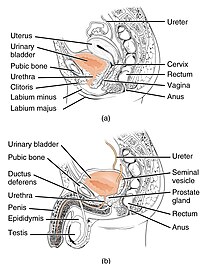
Photo from wikipedia
OBJECTIVE To assess the feasibility and efficacy of bladder training for troublesome lower urinary tract symptoms (LUTS) in Parkinson disease (PD). METHODS In this single-center, single-blinded, randomized controlled trial, participants… Click to show full abstract
OBJECTIVE To assess the feasibility and efficacy of bladder training for troublesome lower urinary tract symptoms (LUTS) in Parkinson disease (PD). METHODS In this single-center, single-blinded, randomized controlled trial, participants with a history of PD and LUTS were randomized to a 12-week bladder training program (BT) or conservative advice (CA). Outcome measures included a 3-day volume frequency diary, International Consultation on Incontinence Questionnaire (ICIQ)-Overactive Bladder Module, and ICIQ-Quality of Life Module. Co-primary endpoints were (1) patient perception of change and (2) change in number of urgency episodes at 12 weeks. Secondary endpoints included change in ICIQ scores, number of micturitions, and volume voided. RESULTS Thirty-eight participants were randomized (18 to CA, 20 to BT). Both CA and BT were associated with significant improvements in volume voided, number of micturitions, symptom severity scores, and measures of quality of life (all p < 0.05). At 12 weeks, compared to CA, BT was associated with significant superiority on patient perception of improvement (p = 0.001), significantly greater reductions in number of voids in 24 hours (mean decrease 2.3 ± 0.8 voids vs 0.3 ± 0.5 [p < 0.05]), and greater reductions in interference with daily life (2.1 ± 0.8 point improvement vs 0.3 ± 0.7 point deterioration [p < 0.05]). BT was not associated with change in urgency episodes (mean change 2.4 ± 1.5 urgency episodes vs 3.5 ± 1.5 [p NS]). At 20 weeks, BT remained associated with greater improvement in interference in daily life. Loss of significance in other measures may reflect loss of power from loss to follow-up. CONCLUSION This controlled trial demonstrated the potential benefits of BT for LUTS in PD. CLASSIFICATION OF EVIDENCE This study provides Class III evidence that for patients with PD and LUTS, BT significantly increased patient perception of improvement but did not significantly reduce urgency episodes.
Journal Title: Neurology
Year Published: 2020
Link to full text (if available)
Share on Social Media: Sign Up to like & get
recommendations!